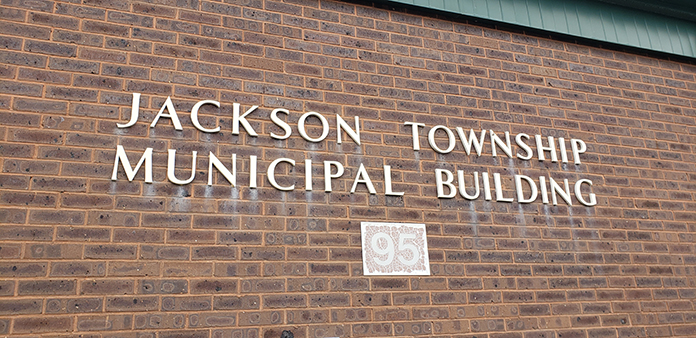
JACKSON – Council members recently moved to modify the wording of an ordinance concerning the application process for entertainment and special event permits.
The wording changes current township code putting the decision-making authority into the administrative side of the township’s government.
Resident Elenor Hannum said she was speaking on behalf of other residents who reached out to her who were very concerned. She called for more details about the ordinance.
Council President Andrew Kern said, “for this ordinance the reason for the change is not because we are trying to take power away from ourselves and condense it somewhere else. When (the township) government changed (from a committee system to a Mayor and Council) that power was already removed. We (the council) have no dealings in the day to day running of the township.”
“Who wrote this?” Hannum asked.
Kern responded that Township Attorney Gregory McGuckin did.
“I think the public deserves to understand the reasoning for it. I think it is our right to know who is behind the writing of this ordinance,” Hannum added.
“For me to start to tell you which council person talked to me about an ordinance starts in invade on the attorney client privilege,” McGuckin said. “You have every right on how they are going to vote.”
“We have a right to know why this is being done? This is giving the complete decision making to one person. I am questioning why this is being taken out of the population of who we put into office to represent us. Is this being done for a specific individual that has their own personal political goal” she asked.
“The piece here is that anything that would come before us would be a resolution that would not get a public hearing. Your goal here is to maintain the public hearing portion. Is that what you are trying to maintain?” Kern asked Hannum.
She said she felt the residents had a right to know “if there is going to be a jazz festival, a rock concert or another mass public gathering of up to a thousand people, I think the public has a right to know.”
Hannum said with the amended ordinance “this just says I’m going to fill out an application. I’m going to give it to Mr. (Terence) Wall who will look it over (as Township Business Administrator) and he will look at whether the police force can cover it, public works, the fire code what have you. The residents that live in that area have no idea of what is about to happen.”
The resident posed the scenario of a family hosting a huge party that day. “Maybe they are hosting their daughter’s wedding in the back yard. They have a right to know,” Hannum added.
“The assertion that this is putting an ordinance, which is an administrative effort, on one person is not accurate,” Wall said.
Kern added, “when we changed the form of government, the authority already rested on the mayor. The fact that they (the governing body) didn’t change the verbiage of that portion of the code is one of many things we discovered that were overlooked.”
The council president said that with all other matters of permit applications, “it goes to police, fire and all the other entities and reviewed then gets approved by the mayor (Michael Reina), Mr. Wall, the mayor’s designee who is the business administrator. That is how that portion goes.”
“If you are saying that there should be notice given to people within a certain distance like a regular permit, I don’t know that it is not part of the regular permit for this,” Kern added.
Notify Residents
Kern gave the example of a building permit that for everyone 200 feet “or whatever it may be gets notification. If that is not included, we can come back and amend that and I would absolutely be behind that.”
Hannum said that being the case, “could we hold off voting on it?”
“That would be a different piece as this is only removing authority,” Kern said.
Hannum disagreed; she asserted that the ordinance was rewritten and putting the onus on one individual.
Kern clarified it was put on “all the administration” including all township agencies that would have to review the permit.
“Those are not the people that the public elected,” Hannum maintained. “They are appointed. At this juncture and time, I don’t know how much trust I have in our mayor and that is where this comes from.”
She said the ordinance was the result of the Jackson Adventure Crossing development project. “That is what this is for with no regard to anyone who lives in that neighborhood. She said that the township reviews the Great Adventure fireworks permit process regularly.”
“Without a hearing,” Kern added.
“We still have the opportunity to hear it. It is on the record and the residents know about it,” she added.
The permit applications have to be in 60 days before an event and it was noted that the administrator can announce notice that an application was issued and could serve as public notice.
“That isn’t legal because it has to be in writing. What you say, means nothing,” Hannum responded.
A policy of notification could be established according to the council. “Any ordinance that puts an additional burden on the administrative side is taken very seriously. We work in accordance to the ordinance,” Wall said.
“If there is a request for a permit, the Jackson Police Department will vet an application. The Jackson Township Zoning Officer will vet an application and the fire district will vet an application. Multiple departments, multiple sworn officers with very specific lines of authority with certifications and licenses that would speak to the veracity to an application,” Wall added.
Keith Jolliffee was the only other resident to speak on this issue. He said he didn’t notice many changes in the wording from the old to new ordinance but asked for clarification saying “the process now is that the permit would go to the mayor’s office?”
Kern said permit requests would go to Wall as the mayor’s designee. “The change is that we are just cleaning up the language” Notification is not included in the ordinance but “is something that would absolutely be considered. This is the language we needed to start the process.”






